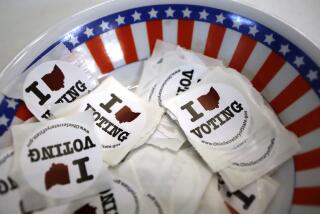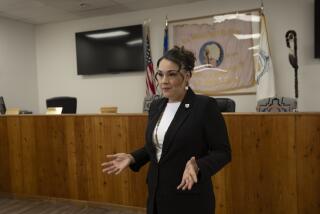Vote-by-Mail Law Upheld on Appeal
- Share via
In an unprecedented ruling with strong national ramifications, a federal appeals court on Wednesday upheld a state’s law mandating voting by mail.
In a 3-0 ruling, the U.S. 9th Circuit Court of Appeals in San Francisco rebuffed a challenge to Oregon’s 1998 vote-by-mail statute from the Voting Integrity Project, a Virginia-based organization that contends the state law impermissibly conflicts with a federal law directing that everyone vote for president on the same day.
The court acknowledged that Congress enacted a law in 1872 providing for presidential elections to be held throughout the nation on the same day. However, the court said that statute had implicitly been trumped by statutes providing for absentee balloting and a U.S. Supreme Court decision upholding the absentee ballot process.
The appellate judges said that if they had invalidated the Oregon law, the first in the nation to eliminate polling places, it could have cast doubt on absentee balloting throughout the nation.
Under the law, Oregon voters receive their ballots in the mail and have two to three weeks to return them by mail or at centralized drop-off locations.
Opposite Ruling Might Have Blocked Reforms
The decision was hailed by Loyola Law School professor Rick Hasen, an election law specialist. He said it is particularly important because of the wide range of changes in voting procedures being considered in the aftermath of the protracted battle to resolve whether George W. Bush or Al Gore won the presidential balloting in Florida and consequently the national election.
“A contrary decision would have called into doubt” recent experiments with Internet voting as well as other initiatives that have been suggested since the 2000 election, Hasen said.
All states allow absentee voting, but no other state has a system where mail voting is the dominant method of casting ballots. The method took effect after Oregon voters in 1998 overwhelmingly passed an initiative providing that all voting in the state be conducted by mail.
The League of Women Voters in Oregon was the prime mover behind the law in an effort to increase voter turnout and save the state money.
So far, the system has been a success, according to state officials and University of Oregon political science professor Priscilla Southwell, who studied it under a National Science Foundation grant. Southwell said turnout has increased about 10% and state officials say the statute saves about $3 million per election because there is no need to hire poll watchers.
Michael D. Reynolds of the Oregon solicitor general’s office said he is pleased with the ruling, which upheld a 1999 decision by a federal trial judge in Portland.
“If the court had agreed with the plaintiffs, absentee voting would be dead,” Reynolds said. “That can’t be, because Congress has approved, and even required, absentee voting” in some circumstances, Reynolds said.
Supreme Court Appeal Considered
Attorney M. Miller Baker of Washington, D.C., who represented the conservative-leaning Voting Integrity Project, said he was disappointed in the outcome and was strongly considering an appeal to the U.S. Supreme Court. Rulings by the 9th Circuit cover nine Western states including California, but the effect in this instance could be broader because it’s the first such ruling by a federal appellate court.
Baker asserted that the Oregon law is different from traditional absentee ballot laws, which make it possible for individuals to vote before election day under certain circumstances.
“The Oregon law is the exception that swallows” the entire congressional law calling for voting on the same day, Baker said.
The Voting Integrity Project has been challenging statutes permitting “early voting” around the country, so far without success.
Last year, the U.S. 5th Circuit Court of Appeals in New Orleans rejected a challenge the organization made to a Texas statute that allows voting to begin 17 days before federal election day at polling places. The Supreme Court declined to review that ruling.
The U.S. 6th Circuit Court of Appeals in Cincinnati is considering a similar challenge to Tennessee’s early voting law, which is similar to that of Texas, that the group lodged unsuccessfully in federal district court in Chattanooga.
And the group unsuccessfully challenged Internet voting in Arizona. Last year, during the Democratic presidential primary in Arizona, voting over the Internet was one of four methods by which voters could cast ballots.
Baker said he hopes that eventually the Supreme Court will take up the issue. He maintained that “Internet voting and voting by mail have very substantial election fraud issues.”
Other critics of the Oregon law, such as Oregon State political science professor William Lunch, also have expressed concern about the possibility of fraud, but no evidence has been produced and that issue was not before the 9th Circuit.
Michael Alvarez, associate professor of political science at the California Institute of Technology, applauded the decision while expressing concern about potential fraud. He said that if the decision had gone the other way it could have “snuffed out” other experiments with early voting systems. For example, Alvarez noted that during the 2000 presidential election, Los Angeles County utilized touch-screen voting at selected locations before election day. “The feeling of a lot of people in the Caltech-MIT Voting Project is that we would like to see more experiments like this, rather than more voting by mail on demand,” as in Oregon, “which has a security risk.”
In Wednesday’s decision, the 9th Circuit acknowledged that the law Congress enacted in 1872 specifically rejected the idea of voting on multiple days.
However, Judge Andrew J. Kleinfeld’s opinion on Wednesday noted that although the absentee balloting that Congress had mandated for federal elections was less sweeping than Oregon’s, Congress had expressly frowned on restrictions against absentee balloting.
When a court is confronted with conflicting laws, Kleinfeld wrote, “we are under a duty to construe statutes harmoniously where that can be done.”
In this instance, Kleinfeld wrote, that could be done because of a 1997 Supreme Court decision, Foster vs. Love. In that case, the high court overturned a Louisiana statute that required all candidates for the U.S. Senate and the House of Representatives to run together in an open primary. If a candidate won a majority in the primary, that candidate was elected, meaning there was no vote in November.
The Supreme Court held that Louisiana had impermissibly “provided for federal elections before federal election day.” However, in Oregon, no final selection is made until election day, the court noted. Consequently, the statute is in compliance with the federal election day statute, Kleinfeld wrote. Judges William A. Fletcher and Ruggero J. Aldisert joined in the decision in Voting Integrity Project vs. Keisling, No. 99-35337.
More to Read
Sign up for Essential California
The most important California stories and recommendations in your inbox every morning.
You may occasionally receive promotional content from the Los Angeles Times.













